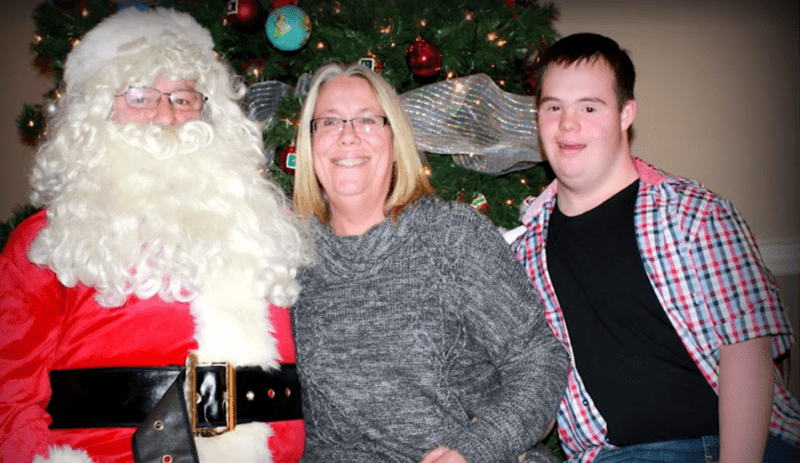Be Kind. It is a simple message, but it truly does encompass Ryan Hack.
At 19 years old, Ryan is a senior at East Duncan High School in London, Ontario. In many ways he’s an average teenager. He likes to play on his iPad, walk his dog Beethoven and hang out with friends. But Ryan has something in common with 45,000 other Canadians, Down Syndrome.
According to the Canadian Down Syndrome Society, Down Syndrome is a developmental disability derived from extra genetic material with the 21st chromosome. This occurs when the cell is dividing as the egg and sperm meet. The impact on development varies dependent on the individual.
Tammy Hack, Ryan’s mom, has learned the different stereotypes associated with Down Syndrome through her daily interactions with the public. These include misplaced ideas such as that people with Down Syndrome are always happy. However, Tammy highlights that Ryan is a teenager, and like all teenagers he has a range of moods outside of happiness.
Further, people assume those with Down Syndrome can’t learn or be a productive part of society.
But these assumptions are untrue.
“People want to place every characteristic they have and place it with the Down Syndrome when it’s not,” said Tammy. “That’s a big stigma.”
Ryan is constantly challenging these characteristics through his daily actions. He excels at his job as a cleaner at Fresh Mart. Using his ambition Ryan attended a job fair and worked hard to earn the confidence of his employers.
His interpersonal skills and determination resulted in success as Ryan was offered a job immediately. As a result of his hard work, he won the Junior Achievements last year for the most sales. Ryan’s list of goals is a long one. However, with his determination and hard work ethic it is one he is going to achieve.
“He’s very ambitious,” said Tammy. “These personality traits don’t have anything to do with Down Syndrome. If you want it bad enough you’ll get it.”
Further, Ryan is going to graduate this year. After he graduates he hopes to go to Fanshawe College to work in an office. Although many may have a misperception about the ability levels of those with Down Syndrome, Ryan sets his goals no matter what others think of them.
“Ryan has always been outgoing. He is goal driven. He won’t let anyone say he can’t do it,” said Terri Manning, the president of the London Down Syndrome Association. (LDSA)
Ryan’s ambition is leading him to work towards living on his own and learning to cook.
“I want to be independent,” said Ryan.
This aspect of Ryan challenges the stereotypical view of those with Down Syndrome. It’s a widely held belief that those with Down Syndrome cannot socialize with others. However, Ryan in his daily life is proving this stereotype is far from the truth as he is incredible kind and fun.
“Ryan is an awesome young man,” said Manning. “Ryan has always been outgoing. He is not afraid to live life to the fullest.”
Tammy describes her son as being social from the day he was born. Everyone notices his exceptional social skills that engage and creates connections with many.
“Those social skills will take him anywhere he wants to go in life,” said Tammy.
Again, Tammy emphasizes that this personality trait is not because of Down Syndrome. Alternatively, these traits are unique to Ryan. It’s not Down Syndrome that defines him. Ryan defines himself. His strong personality traits arise from within and shine outwards. It’s difficult to meet him and not instantly recognize he is personable, outgoing, ambitious, funny, and friendly.
Through telling Ryan’s story, both Manning and Tammy hope it can change the perception of people with Down Syndrome.
“It’s important to put ourselves out there letting people know we’re more like them than unlike them,” said Manning.
Mirroring Manning’s thoughts, Tammy argues there needs to be more media representation of people with Down Syndrome. There has been some progress made with the A&E television series “Born This Way” which follows the lives of those living with Down Syndrome. As well, the Gerber Baby spokesperson was recently changed to a child with Down Syndrome after a social media campaign. This is the first time the company has had a child with Down Syndrome in 91 years.
Although, these media representations are progress, most people associated with Down Syndrome believe they are not enough. There needs to be more representation across the media to challenge the norms. This is essential to establish a realistic understanding of those living with disabilities. Outside of the media, there are plenty of local organizations for those living with the conditions.
Tammy and Ryan seek support through the LDSA, one such of these organizations.
Established in 1983, the LDSA is a registered charity that evolved from a group of parents who were part of the Parent Support Group within the Child and Parent Research Institute. The vision of the association is to have services to support and enrich the lives of those living with Down Syndrome. Part of that mission involves working to fundraise to offer approachable and compassionate support to the families and those living with Down Syndrome.
“Our community stems from our vision and mission, which is to support and enrich the lives of those with Down Syndrome,” said Manning. “It’s important to recognize that these people with Down Syndrome have so much potential, they just need support.”
According to Tammy the support they received from the LDSA was huge. When Ryan was younger the community offered him peers to look up to as role models.
Now as Ryan is older, he acts a role model to demonstrate to others that there are no limits on what people with Down Syndrome can achieve.


